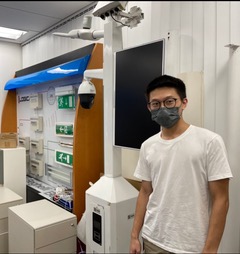BEng (Hons) Electronic and Computer Engineering
Introduction
Electronic and computer engineers play a vital role in the design, development, distribution and eventual recycling of numerous everyday products. This programme equips you with the necessary technical and professional knowledge, concepts and skills via the blending of theoretical knowledge and practical applications.
Programme Features
Laboratory competence
This programme has a strong emphasis on practical work. You will be equipped with key laboratory skills and competences as well as good laboratory practice.
Modules
- Professionalism for Engineers
-
This module develops the concept of the Professional Engineer and how this impacts your career. You will study current literature on the role of the engineer in creating a sustainable future for business and society. You will understand the skills required to operate within a modern engineering environment and understand where future opportunities lie as you think about your future career.
- Group Design and Integration Project (CEF Module)
-
 (CEF Code: 36Z121702)
(CEF Code: 36Z121702)
In this module, you will learn to use management techniques related to decision making and project management processes and apply engineering design processes in hardware/software co-design and real-time systems development. During the development process, you are expected to critically analyse the design process and outcomes, as well as analyse and make appropriate use of technical literature, intellectual property and licensing. - Power Electronics
-
Power conversion and transmission technologies are essential and pervasive. A deep and comprehensive understanding of the scientific and engineering principles that support the field of power electronics provides a vital background for electronic engineers wishing to address the engineering challenges posed by the generation and transmission of power for industry, retail and domestic use. The module provides an opportunity for students to explore and understand the environmental and ethical issues in this field of engineering.
- Embedded Systems Development 1 (CEF Module)
-
 (CEF Code: 36Z161097)
(CEF Code: 36Z161097)This module will introduce the students to study the role of hardware and software in developing the functional behaviour of embedded systems. The module also will provide an introduction to hardware analysis, software requirements, and design methodologies. Great emphasis is placed on the modelling of the behaviour.
- Engineering Project
-
The project is designed to provide an opportunity for you to undertake individual, self-directed work, in an area of your choice related to this programme, and to further develop your engineering-based knowledge. You will learn to identify the main issues to be examined in the execution of an engineering-related technical project, select appropriate knowledge sources to guide project execution, evaluate data to complete a critical appraisal of the technical work, make clear and well-argued recommendations, and effectively communicate your technical understanding and recommendations.
- Control Systems Design (CEF Module)
-
 . (CEF Code: 36Z161100)
. (CEF Code: 36Z161100) This module develops students' ability to design and analyse complex and modern dynamic system modelling, and use of computational packages to enhance simulation demonstrations. It involves the understanding and using of analytical techniques, interpretation of tasks between customers and designers, and computational experiments as applied to classical and modern dynamic system models.
- Digital Signal Processing (CEF Module)
-
 . (CEF Code: 36Z121699)
. (CEF Code: 36Z121699) Through studying this module, you will be able to understand the engineering principles of digital systems and assess their performances. You will develop the ability to use integrated development environments to describe, simulate, implement and verify the correctness of digital design, and develop your competence in using specific Electronic Design Automation tools.
 This course has been included in the list of reimbursable courses under Continuing Education Fund. The mother course (BEng (Hons) Electronic and Computer Engineering) of this module is recognised under the Qualifications Framework (QF Level 5).
This course has been included in the list of reimbursable courses under Continuing Education Fund. The mother course (BEng (Hons) Electronic and Computer Engineering) of this module is recognised under the Qualifications Framework (QF Level 5).
Assessment
Coursework, laboratory portfolio and examination
QF Level
|
QF Level : Level 5 This programme is in the process of seeking re-accreditation by HKCAAVQ. The re-accreditation is subject to HKCAAVQ’s final approval. |
|
|
Importance of choosing a non-local top-up with QF Level 5Employment
|
|
Entry Requirements |
- Holders of a VTC Higher Diploma (HD) in Electronic/Computer/Information Engineering areas:
-
- HD in Computer and Electronic Engineering+
- HD in Computer and Information Engineering
- HD in Computer Engineering
- HD in Digital Electronics and Embedded System Design
- HD in Electronic and Communications Engineering
- HD in Internet and Multimedia Engineering
- HD in Computer and Data Engineering
OR
Holders of a post-secondary qualification (such as a Higher Diploma or Associate Degree awarded by an educational institution in Hong Kong) in a relevant Engineering area will also be considered.
+For students who enrolled into the HD in Computer and Electronic Engineering programme before AY2023/24, you are required to achieve a pass in the enrichment module 'Engineering Mathematics with Applications'. Applicants without a pass of the ‘Engineering Mathematics with Applications’ module will be required to take and pass a 36-hour enrichment module, "Advanced Mathematics with Applications", prior to programme commencement. An additional fee of HK$3,400 will be charged for the module.
English Proficiency Requirements
OR
|
Fees
- Application Fee : HK$200 (No application fee before the deadline!)
- Registration Fee : HK$3,500
- Tuition Fee : HK$91,240 by 4 instalments
Scholarships
A variety of attractive scholarships are available to prospective, current and graduating SHAPE students.

Financial Aids^
The following HKSAR Government financial assistance schemes are available to eligible students who pursue this programme at SHAPE:
For details including eligibility and subsidy amount, please refer to the hyperlink of each scheme.
^ This programme is in the process of seeking re-accreditation by HKCAAVQ. The HKSAR Government financial assistance schemes for this programme in AY2026/27 will be subject to the HKCAAVQ's final approval for re-accreditation, and the arrangements will be updated in due course.
* Please refer to the Programme Content section of this programme for the reimbursable courses under the CEF.
Career Prospects
This programme equips students for a variety of jobs in the electronic and computer engineering field. Graduates can become computer programmer, mechanical engineer, electrical engineer, industrial engineer, computer systems analyst, computer user support specialist, web developer, or computer network architect.
 |
"After completing my HD studies, I received several offers from local universities, but I decided to study at SHAPE which allowed me to complete a degree in just 18 months (PT) and begin my career earlier. This programme emphasises practical work; I became well-versed and familiar with a wide range of software during the study. I’m now working as a Product Analysis and Communications Engineer and I can apply the knowledge and skills I learned." Chu Chun Yin
|
Further Studies
Having been recognised at QF Level 5, this top-up degree programme meets the standard of locally-accredited bachelor's degree programmes. Upon graduation, students can pursue their further studies at Master’s degree level in Hong Kong or Overseas.
Student Awards
| Student | Award |
| Ho King Hei |
|
Enquiries
|
|
|
|
Programme Coordinator |
Dr. Vincent Choy |
|
Tel. no. |
2256 7559 |
|
|
|
|
General Enquiries |
SHAPE (Sha Tin) Office |
|
Tel. no. |
2256 7240 |
|
|
Connect with SHAPE Community
Connect with UWE Bristol Community





